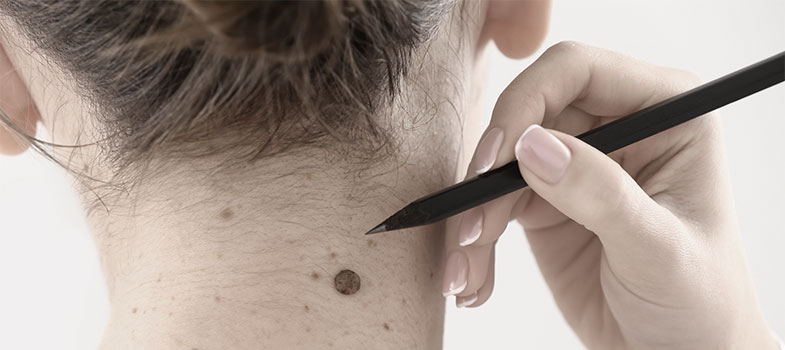
Skin cancer screening

Skin cancer – even malignant melanoma (black skin cancer) – is curable if diagnosed early. Nevertheless, more than 3,000 people die of the consequences every year, including many young people. This shows, on the one hand, how important it is to protect the skin from UV rays and, on the other hand, that regular preventive examinations are essential.
In addition to strong UV exposure, such as extensive sunbathing, a genetic predisposition can also lead to the formation of melanomas. Certain factors can significantly increase the risk of skin cancer. These include the amount of pigmented moles, because the higher the number of moles, the higher the risk of disease. If melanomas have already occurred within the family or especially in one’s own person, the risk of (renewed) disease is also high. In case of congenital pigmented moles as well as massive sunburns in childhood or adolescence, there is also an increased risk of developing skin cancer.
At a Glance
Technical term: skin cancer screening
Type of anesthesia: none
Duration of procedure (treatment time): approx. 15 minutes
Hospital stay: outpatient
Fit for socializing: immediately
Fit for work: immediately
Rest period: none
Procedure
In skin cancer screening, there are various methods that can be used by dermatologists. At clinic utoquai we use technically modern and innovative methods such as the reflected light microscope. This allows us to examine the tissue in detail, right down to the deeper layers of the skin. During the full-body examination, all skin changes and pigmentation marks can be examined in detail.
In addition, we use modern computer technology that calculates malignancy criteria based on the scanning of conspicuous birthmarks. This has the advantage that surgical removal of moles can be avoided in many cases.
We also use video-based photo documentation. Conspicuous findings are measured in detail and microscopically and recorded in a birthmark catalog. Thus, by digitally storing your skin condition, exact comparisons can be made with previous skin findings during regular check-ups.
Aftercare
Skin cancer screening should be performed at regular intervals. Even if previous findings were inconspicuous, screening should take place approximately every two years when you are young. From the age of 30, an examination of the pigmented moles once a year would be advisable. Basically, however, your personal risk profile determines how often skin cancer screening should be performed. This means that the intervals between examinations depend on age, skin type and especially on the type and number of moles.
Costs
Skin cancer screening with a very bright lamp (without incident light microscope) is usually covered by all statutory health insurers from the age of 35. Screening is also advisable for younger people, but this is not covered by all health insurances. Some skin cancer screening examinations, such as with the reflected-light microscope, go beyond the statutory benefits catalog, but are still covered by many health insurance companies. You should discuss this with your health insurance company in advance. If the services are not covered, we will be happy to advise you on the scope and necessary nature of the examinations as well as the costs incurred.









